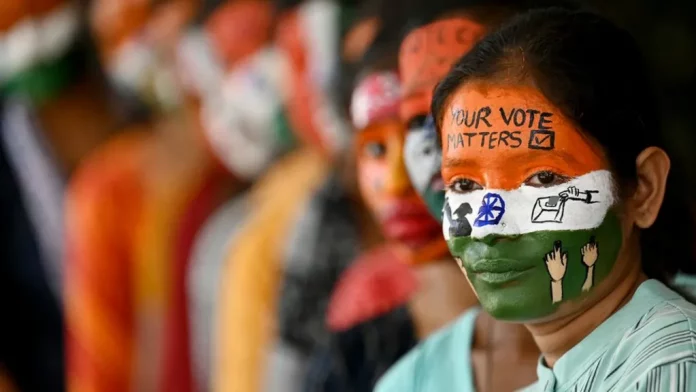The 2024 Lok Sabha election has emerged as a landmark event in India’s political landscape. While the BJP clinched another victory, it was far from a total triumph. Similarly, the Congress-INDIA coalition celebrated significant gains, but their win was not absolute. In truth, the real victor of this election was the Indian voter. This electorate, more mature and discerning than ever, has sent a clear message: the days of rhetoric and grandstanding are over. Both the ruling party and the Opposition now bear the responsibility of ensuring effective governance, where strength in numbers is no longer a guarantee of success, but rather a call to greater accountability and cooperation.
By Vickram Sethi
If ever there was a win-win situation, the Lok Sabha 2024 election was probably the biggest in recent times. The BJP won, yet it didn’t truly triumph. The Congress-INDIA coalition got large numbers, yet their victory wasn’t enough to give them the power to govern. The real winner was clearly the Indian voter.
The Indian electorate has matured, and this election is evidence that rhetoric alone no longer suffices. The dance of democracy is well understood, and the electorate knows its steps. We now have a strong government and a reasonably robust Opposition. The responsibility of ensuring effective and smooth governance now lies with both sides. Mere numerical strength in Parliament is not enough to guarantee a successful term for the nation. The onus for achieving that rests on both the government and the Opposition. As the ruling party, the NDA bears the greater responsibility.
We need peacemakers from both sides. The NDA must take the lead, making sincere and genuine overtures to the Opposition to resolve issues and foster an atmosphere of goodwill.
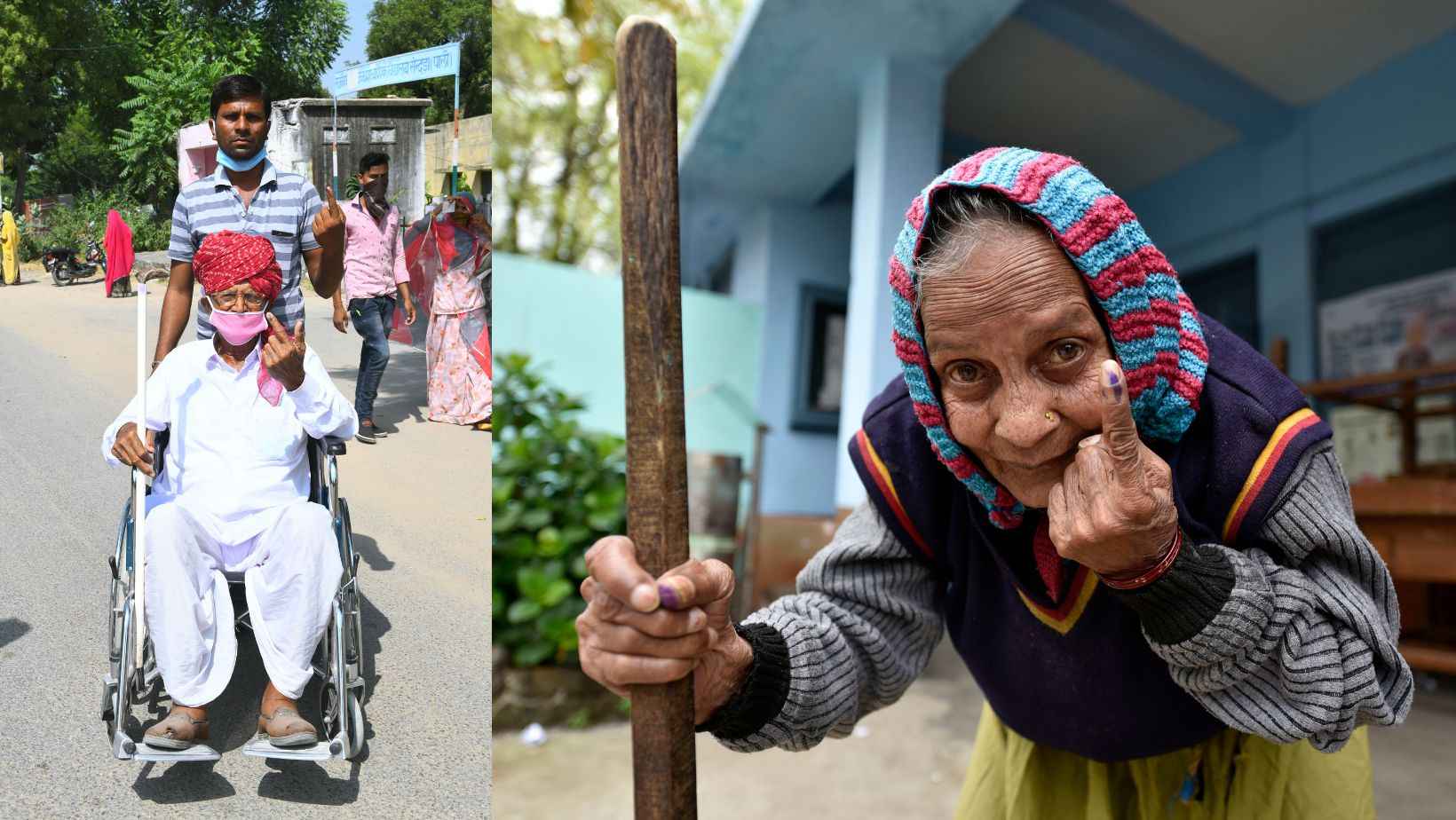
Image courtesy: The Better India
The decisive leadership of Mr Narendra Modi was a breath of fresh air when he took charge in 2014. As the Chief Minister of Gujarat, Mr Modi tolerated no nonsense and kept the bureaucracy in check. Every secretary was on call between 9 and 9:30 in the morning, available for queries from Mr Modi. The message was: clean, corruption-free governance. In fact, if anyone was setting up a factory, Mr Modi would ensure that someone would follow up and confirm that things were progressing smoothly. No other state offered this level of administration. Remarkably, even the common man had access to the Chief Minister, which served as a deterrent to potential bribe-seekers.
Amidst both praise and criticism, there is no denying that Mr Modi’s leadership style and determination to propel India forward have garnered attention, not only within the nation but also on the global stage. His achievements have solidified his position as one of India’s most influential and impactful leaders, following in the footsteps of Pandit Jawaharlal Nehru and Indira Gandhi. He is a leader known to all Indians—whether in cities, small towns or rural areas. His following is one that very few leaders have achieved on the national stage. I have watched on television the roadshows that Mr Modi participated in, with thousands of people lining the streets, waving and cheering for him.
Among the Indian diaspora, Mr Modi is a popular leader, as evidenced by the sheer number of people who attend his events. Critics might claim that the BJP works diligently behind the scenes to boost attendance, but the fact remains that people do show up, filling stadiums to capacity.
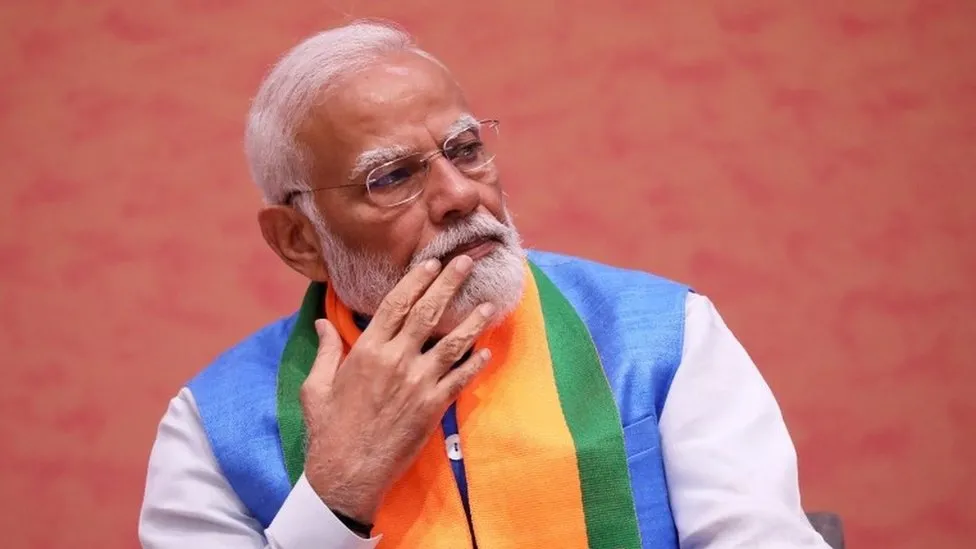
Image Courtesy: bbc.com
Mr Modi has cultivated an international image as a leader who means business and has successfully established personal rapport with many global leaders. One of his key achievements has been the improvement of India’s relationships with major world powers such as the United States, Russia, Japan, the UK, and the European Union. His focus on strengthening ties with Southeast Asian countries has been a notable success. The G20 Summit, BRICS, and other forums have seen Mr Modi’s leadership enable India to play a prominent role in global governance, advocating for critical issues such as climate change and sustainable development. His achievements have secured his position on the global stage, and his vision for a more prosperous and self-reliant India has inspired millions.
However, certain issues have tarnished his reputation, such as the farmers’ protests, the JNU students’ uprising, the Shaheen Bagh protest, and the ensuing conflicts. It is important to note that these issues are complex and that opinions on them vary. These downers notwithstanding, Mr Modi’s legacy as one of India’s most influential and impactful leaders is undeniable. A large segment of India’s middle class remains his ardent supporters, and for every argument against him, there is a hailstorm of arguments in his favour. Such is Mr Modi’s popularity that even close friends might find themselves at odds over him.
Despite winning the election, the NDA must engage in some soul-searching to understand why it failed to connect with the younger generation. The BJP is an election-winning machine, fighting every election with all its might, employing every strategy within and beyond the book, yet it didn’t succeed as much as it would have liked. The answer is simple: they need individuals who can provide an unbiased perspective and perhaps take a fresh look at themselves. I am certain they have done much introspection on this verdict.
The 2024 election results have slightly dented Mr Modi’s image. What has now emerged is a strong Opposition. The nation has a new generation of young politicians who will mature into responsible leaders when their time comes.
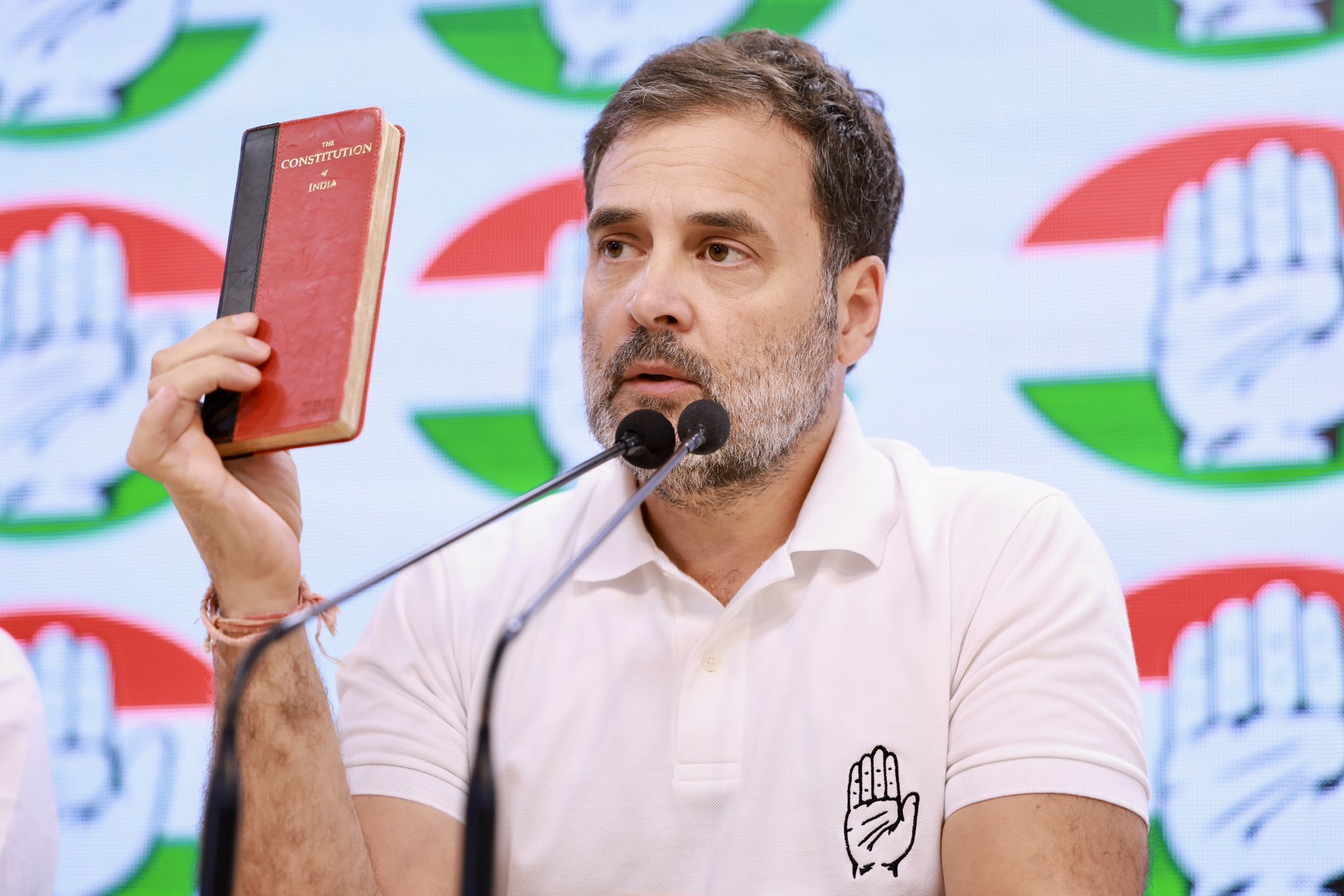
Image Courtsey: X
Rahul Gandhi is Destiny’s Child. In India, political leaders often teach their children the ropes of politics. Unfortunately for Rahul, his father passed away too early and could not groom him in the ways of the world. It is worth recalling that Rajiv Gandhi was not even his mother Indira Gandhi’s political heir; she had groomed Sanjay for that role, which fate intervened to prevent.
The BJP’s social media machine successfully portrayed Rahul Gandhi in a poor light, effectively branding him with the nickname ‘Pappu’. Now, ‘Pappu’, as I know it, is a very common pet name for Pradeep in North India. Pappu, Babbu, Bittu, Pinky, Chuttu, Happy, Lovely, Guddu – all are very common pet names in North India – Punjab and most of the Hindi-speaking regions. After the Cadbury advertisement ‘Pappu pass ho gaya’, the association of ‘Pappu’ with idiocy stuck, colouring his persona with that tint. Only in the past couple of years, thanks to his Bharat Jodo Yatra and the mentorship of Congress President Mallikarjun Kharge, has he managed to shake off the ‘Pappu’ tag.
Rahul Gandhi, Akhilesh Yadav, Tejaswi Yadav, Aditya Thackeray, and many other young leaders have learned how to fight elections. But merely winning an election or putting up a strong fight is not enough; they must learn to be a productive Opposition and chart a roadmap for progress. The mandate given to them is not just for political drama and conflict. They must choose their battles wisely, refraining from attacking the government on every minor issue or attempting to destabilise it.
While it is the Opposition’s duty to hold the government accountable, constant bickering and nitpicking can quickly erode their credibility. This is an opportunity to deliver real work that benefits the nation rather than turning this parliamentary term into a perpetual boxing match between the government and themselves.
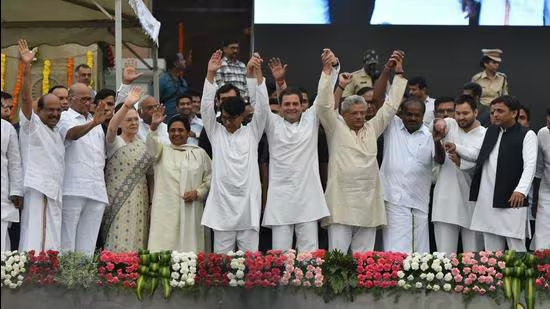
image courtesy: hindustantimes.com
Striking the right balance between decisiveness and consensus will ensure that the government and the Opposition work together to achieve comprehensive progress and meet the expectations of the people. Complacency could prove detrimental; no one must take the Indian voter for granted. It is perhaps for the best that the INDIA coalition did not form the government; it would likely have collapsed before it even came into existence. Rahul Gandhi and the other young Turks will mature and learn valuable lessons in the Opposition.
Yet another factor that has emerged from this election is the role of alternative digital media. The mainstream media seems to have lost credibility as a source of accurate information or opinion on the government, and voices like Ravish Kumar, Dhruv Rathee, Ajit Anjum, and many others have found a receptive audience. This can be attributed to the perception that many in the mainstream media have suppressed the voice of the Opposition.
The fact that many voices critical of the government gained traction suggests that there was a desire for these viewpoints to be heard. Many in the Hindi print media twisted facts or omitted them entirely. YouTube videos and other short-form content have become highly influential agents of change. Covering a wide range of topics—from entertainment and education to fashion, politics, and even controversial content—these formats provide an unfiltered voice for the country. With our increasing reliance on mobile phones, these media formats are ideal for casual browsing, and their impact is far-reaching. Communication has evolved, and this alternative media played a significant role in the 2024 election. The power of this medium lies in its resistance to being countered; one can choose to like, dislike, ignore, or share it, but there is no arguing with it. It conveys its message with precision, and its shareability allows it to be rapidly circulated, making it even more potent.
In these turbulent times, we often find ourselves at the crossroads. The challenges ahead are immense, but so too are the opportunities. As a nation celebrating 77 years of independence, we must move forward with a spirit of unity, compassion, and understanding, drawing strength from the lessons of the past and the aspirations for a brighter future. Let us embrace the promise of a new dawn, where progress is not just a word but a reality for every Indian. May our leaders, whether in government or in Opposition, rise to the occasion, setting aside differences to work together for the greater good of the country.
I would like to conclude with a poem that resonates with the times we live in, with apologies to the accomplished poet, Zehra Nigah:
सुना है जंगलों का भी कोई दस्तूर होता है
सुना है शेर का जब पेट भर जाए तो वो हमला नहीं करता
दरख़्तों की घनी छाँव में जा कर लेट जाता है
हवा के तेज़ झोंके जब दरख़्तों को हिलाते हैं
तो मैना अपने बच्चे छोड़ कर
कव्वे के अंडों को परों से थाम लेती है
सुना है घोंसले से कोई बच्चा गिर पड़े तो सारा जंगल जाग जाता है
सुना है जब किसी नद्दी के पानी में
बए के घोंसले का गंदुमी रंग लरज़ता है
तो नद्दी की रुपहली मछलियाँ उस को पड़ोसन मान लेती हैं
कभी तूफ़ान आ जाए, कोई पुल टूट जाए तो
किसी लकड़ी के तख़्ते पर
गिलहरी, साँप, बकरी और चीता साथ होते हैं
सुना है जंगलों का भी कोई दस्तूर होता है
सुना है जंगलों का भी कोई दस्तूर होता है
(I have heard that even forests have their own rules.
I have heard that when a lion’s hunger is sated, it does not attack.
It lies down in the dense shade of the trees.
When strong winds shake the trees,
The myna bird, abandoning her own chicks,
Holds the crow’s eggs beneath her wings.
I have heard that if a young bird falls from its nest, the entire forest awakens.
I have heard that when the golden color of a hawk’s nest shimmers in a river’s waters,
The river’s silver fish consider it a neighbour.
If a storm comes, or a bridge collapses,
On a plank of wood,
A squirrel, a snake, a goat, and a cheetah are together.
I have heard that even forests have their own rules.
I have heard that even forests have their own rules.)



